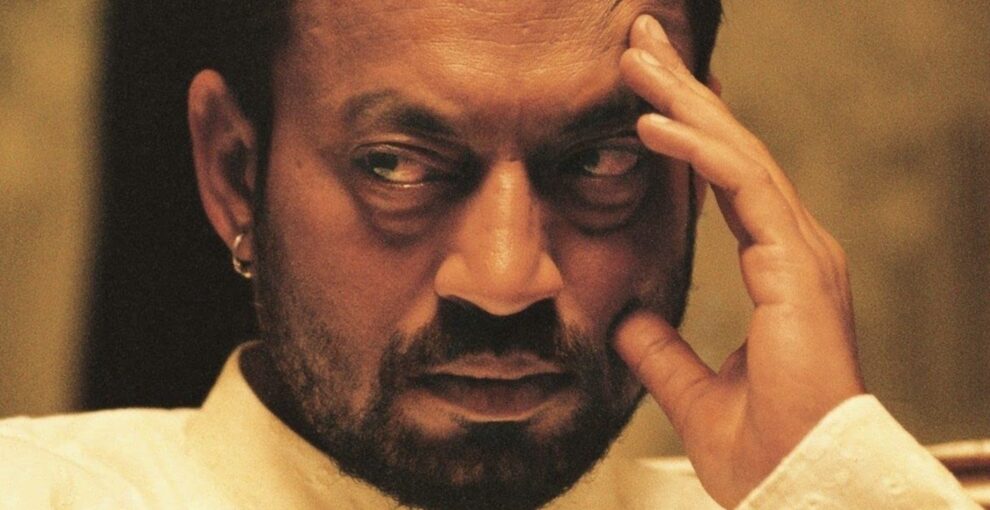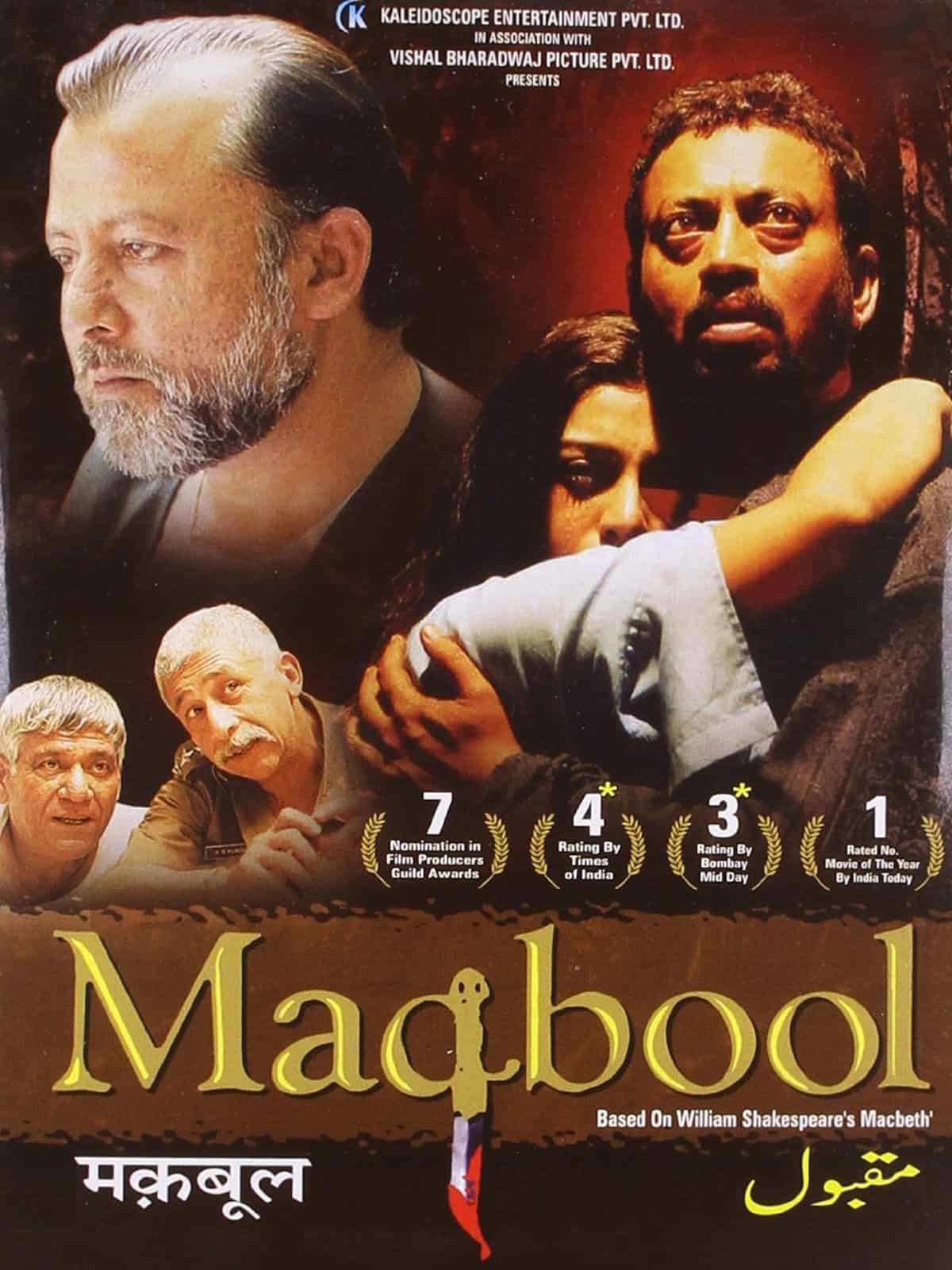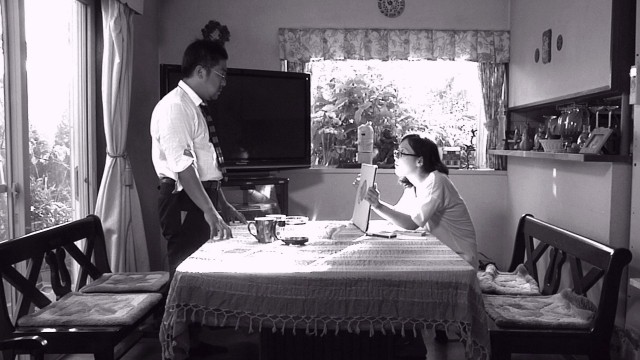Around the turn of the century, modern reimaginings of Shakespeare had reached a fever pitch. Audiences were rediscovering the Bard's work through a string of stylish Hollywood films ranging from Baz Luhrmann's bombastic “Romeo + Juliet” to Michael Almereyda's gen-X-courting “Hamlet” to fun teen comedies like “10 Things I Hate About You.” It wasn't long before the trend reached the Indian film industry, which had previously produced only a small selection of Shakespeare adaptations. The charge was led by Vishal Bhardwaj, who received widespread acclaim for 2003's “Maqbool,” his violent take on “Macbeth” featuring Irrfan Khan in the lead role. Transposing the Scottish Play's power struggles to 21st-century Mumbai, Bhardwaj takes a haunting approach to the material, leaning into the bloodshed while playing with the supernatural moodiness and psychological torment of its protagonist. Bhardwaj would continue his Shakespeare trilogy with “Omkara” (“Othello”) in 2006 and “Haider” (“Hamlet”) in 2014, both of which were more commercially successful, but it's worth looking back at the film that started it all as we approach its 20th anniversary.
The story itself won't contain too many surprises for those familiar with the source material, but there are some interesting deviations. Here, Miyan Maqbool (Khan) is an underboss in a powerful crime family led by the feared Abbaji (Pankaj Kapur). After two crooked cops with an interest in astrology (Naseeruddin Shah and Om Puri) predict that he will soon take the boss's throne, Maqbool's simmering ambition clashes with his loyalty. Complicating matters is his attraction to Abbaji's mistress, Nimmi (Tabu), who tells him that he should kill Abbaji in order to take over.
This is glossing over several criminal subplots involving rival gangs and politicians and rules of succession. These narrative threads expand on the feudal politics of the play, giving the underworld machinations a feeling of specificity that could have been lost in a more streamlined narrative. Despite these crime epic flourishes, Bhardwaj and co-writer Abbas Tyrewala don't stray too far from the original chain of events.
The biggest change is the central love triangle. By making Tabu's Lady Macbeth character a mistress to the “king,” the film adds a layer of tension and perversity to the central betrayal. Instead of having a wife who plants murderous ideas in his head, Maqbool starts out as a solitary, repressed person. His desire for Nimmu symbolizes his desire for power, and most of the first half finds him torn over what he should do with these feelings of attraction. His dilemma is complicated by the fact that he views Abbaji to be a surrogate father figure, and there's a familial love between them that is rarely shown between Macbeth and King Duncan.
The script muddies and deepens the motivations of an already paradoxical character, but Khan is up to the challenge, turning in a spellbinding performance that feels completely lived-in. In contrast to Prince Hamlet's emotional paralysis, actors have often used Macbeth as a way to exorcise their lustier, more kinetic impulses. Khan, however, imagines Maqbool as a bottled-up man who is never sure about his treacherous thoughts and refuses to take responsibility for the horror he has wrought upon his “kingdom.” He only decides on a course of action around halfway into the film, making his ultimate betrayal that much more agonizing. Khan's always piercing eyes have rarely been as intense as when Maqbool is forced to look at the bloody result of his evil doings. It's an unforgettable moment.
The other performances are just as strong. Tabu's Nimmi initially comes off almost like a scheming and mischievous child who gets a thrill from testing boundaries, but the performance twists into something more disturbing. She beautifully taps into the guilt that begins to rot the character from the inside out, and her version of the “out, damned spot” monologue is jaw-dropping. Pankaj Kapur is also a highlight, transforming himself into a king defined as much by his vulnerability as his ruthlessness. With dark eyes and an exaggerated stoop in his gait, he injects the role with a Vito Corleone-esque weariness that dominates each scene he's in. As modern Mumbai's answer to feudal Scotland's weird witches, Naseeruddin Shah and Om Puri provide the film with both its humor and its off-kilter moral compass. An entire spin-off could have been made just about their strange duo.
Kapur isn't the only one who warrants comparison to “The Godfather,” as there are several scenes that bring to mind Coppola's blend of gritty realism and old-school classicism. Behind the camera, Bhardwaj and cinematographer Hemant Chaturvedi lend the tale a vibrant texture. Chaturvedi had already cut his teeth on the gangster drama “Company” a year prior, meaning that he understood how to capture the street-level beauty found in the best gangster films. His evocative imagery coupled with Bhardwaj's bold sense of shot composition results in a film with modern sensibilities that also looks like it could have been made twenty or thirty years before it was released. This mix of cutting-edge passion with old-school formalism allows for “Maqbool” to update Shakespeare's work while maintaining its mythic quality. It's a must see not just for fans of the play or crime cinema or the talent involved, but for anyone who cares about the kind of vision-driven moviemaking that we need so desperately in theaters today.

















